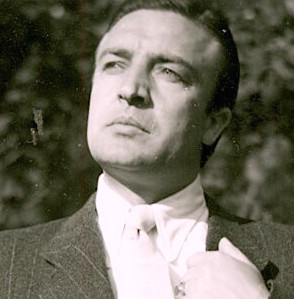The Unimaginable Journey of Matthew Troyan:
From Holocaust to Abstract Expressionism
Just after World War II, a raucous group of artists in New York City known as the “The Irascibles” wrested away from Paris the title of capitol of the art world. Many art historians have written about those first ten years of Abstract Expressionism and the creative group who have been credited as the movement’s heroes: Pollock, Rothko, de Kooning, Kline, Reinhardt, Gottlieb, Hoffman, and others. But before the turn of the 21st century deeper research had gained momentum and now has shined new light on other first generation members of the group who had unfortunately remained unnoticed by art historians. Among those rediscovered masters is Matthew Troyan [1913–2007]. His best friend in the group — Franz Kline — described Troyan as one of the best colorists, if not the best, he had ever known.
Troyan’s artistic path is made even more extraordinary owing to the fact that he is the only Abstract Expressionist to have survived the Holocaust. If Jackson Pollock’s artistic drive came from deep introspection, ontological exploration, and Jungian psychology, Troyan’s horrific experiences at three Nazi concentration camps — and his consequent spiritual quest — were the wellspring of his gestural brushstrokes made even more powerful by his understanding of color.
Troyan was raised in a traditional Catholic family in Kielce, just south of Warsaw. When he was a baby his father, a decorative blacksmith, was among the political activists and resistance fighters who helped Kielce become the first Polish city to be liberated from Russian rule. Tragically, his father died in 1916 when Troyan was only three.
In 1937 Troyan entered the Warsaw Academy of Fine Art. But in 1939, at the beginning of the invasion by the German Army, he took a role his father had played in proving why the citizens of Kielce would become Poland’s most famous resistance fighters. He quickly joined the Polish Cavalry and rode two hundred miles north to the critical Battle of the Tuchola Forest. Despite his cavalry’s courageous victory on the first day, the ensuing days saw the overwhelming power of the German panzer tanks and ground forces annihilate the Poles. Troyan witnessed most of his comrades being slaughtered — and his own horse was shot from under him. But he miraculously survived and trudged back to Warsaw to rejoin his army group. He was allowed to return to the Warsaw Academy of Fine Art where he graduated in 1941 with high distinction.
However, in February 1942 he was captured by the Nazi SS and sent to Auschwitz as a “traitor to the state.” Just three months earlier his mentor, the director at the Warsaw Academy of Art, had been executed for the same charge….aiding Jews. Worse, at Auschwitz he learned that one of his own brothers had been executed. The only reason that Troyan was spared was his artistic talent — the commandant at Auschwitz used him to paint portraits of the Nazi officers. This same “job” kept him alive when he was transferred to Mauthausen and Ebensee. Although Troyan’s camp job occasionally afforded him small privileges, hard labor was regularly forced upon him along with the cruel living conditions of the camps. He was once beaten so severely that one of his ears was nearly torn off. One fellow survivor later wrote that Troyan did his best to use his guile to aid others. Once, when he took advantage of access to the bakery he stole some loaves of bread for five of his close friends. But he was later caught. As punishment, rather than being executed himself, he was forced to watch as each of his friends were shot in the head, one by one, at point blank range. At the third camp, Ebensee, Troyan escaped execution only because the Allied Forces liberated the camp just in time — He learned that his execution had been scheduled to take place four days later. Of the six million Polish citizens who were murdered in the concentration camps, three million were Polish Jews and the other three million were Polish Christians, like Troyan.
Back in Warsaw, when the smoke had finally cleared, most of the city had been reduced to an unimaginable 720 million cubic feet of rubble with 800,000 dead. Immediately after being freed from Ebensee, Troyan instead travelled to Dusseldorf, another city that had been heavily bombed, and studied at the Academy of Fine Art at Dusseldorf from 1945 to 1950. Because of his studies at Warsaw he had become well trained in art history and creatively drawn to German Expressionism. In addition, the artist with the greatest impact upon him was Karl Schmidt-Rottluff [1884 –1976], who became both a mentor and a close friend. Troyan was also imbued with the works of Kandinsky, the father of Abstract Expressionism. In fact, Troyan was by 1940 already painting in a robust gestural style that predates any of the Abstract Expressionists of New York whom he would later come to know.
Upon graduation in 1950 Troyan immigrated to New York as a “displaced person” and quickly assimilated with the artists in Greenwich Village. Among his best friends were de Kooning and Kline, and he came to know Pollock better than he would have wished.
In 1953, after a drunken Pollock instigated a fight, Troyan abruptly moved to the bucolic countryside of Connecticut. Troyan said he had experienced enough violence in his life. Late in life he confessed, “Everyday I can still smell the smoke from the burning bodies in the crematorium.”
Despite being given two solo exhibitions at the New Britain Museum of American Art (in 1954 and 1965) Troyan never sought the limelight of New York, preferring instead to capture with exuberance the colors of his flower garden and take numerous portrait commissions. Here was a man who had overcome severe adversity to finally arise from the ashes of the Holocaust. He then embarked upon a quest that resulted in a vast body of paintings, the wellspring for which may more appropriately be called spiritual expressionism. In an art world teeming with slavish followers, conceptualists, and visual sloths he achieved his artistic breakthroughs on his own terms — far from the influence of the New York Abstract Expressionists.
— Peter Hastings Falk, 2015
Note:
The source for this essay is Dr. Robert H. Baker’s monograph, Matthew Troyan: His Spirit and His Art [Bellport, NY: RHB Publishing, 2014]. The first survey of Troyan’s work was held at the National Arts Club (Dec 2011–Jan 2012), curated by Dr. Baker.
An Unimaginable Journey
-
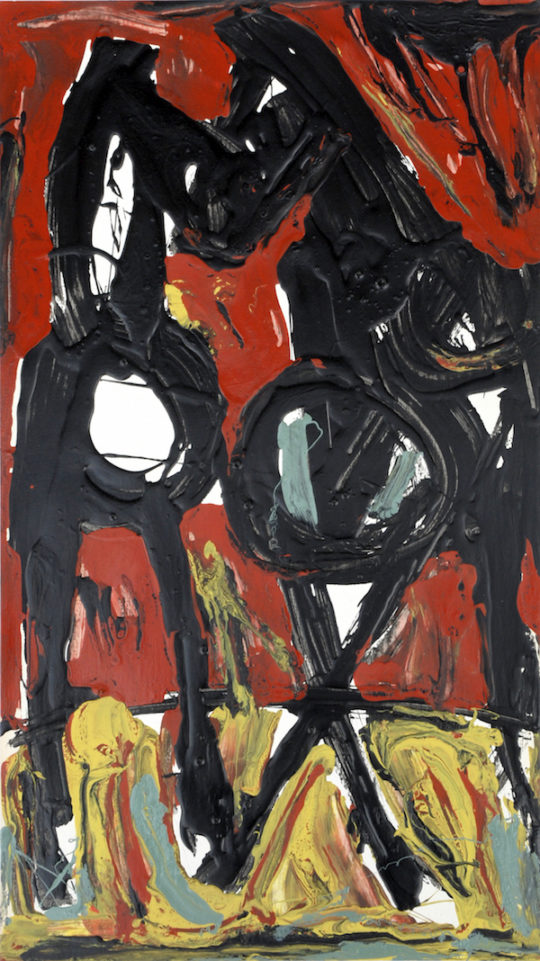
A Conversation, 1952
11 x 20 inches (27.94 x 50.8 cm) -
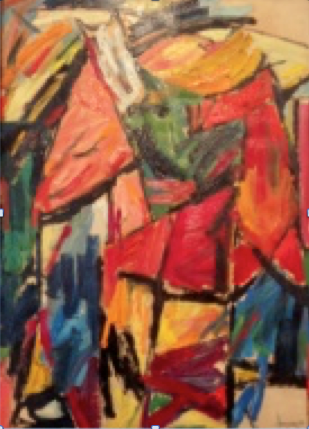
A Perspective, 1960
18 x 28 inches (45.72 x 71.12 cm) -
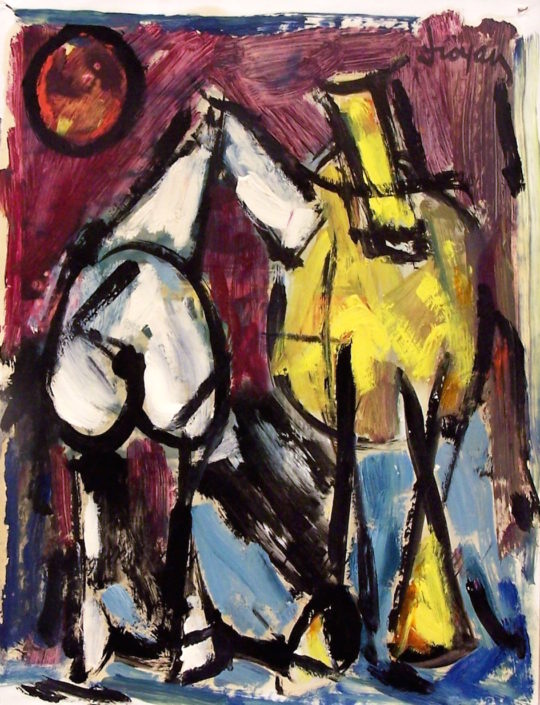
A Soft Word, 1960
10.5 x 14 inches (26.67 x 35.56 cm) -
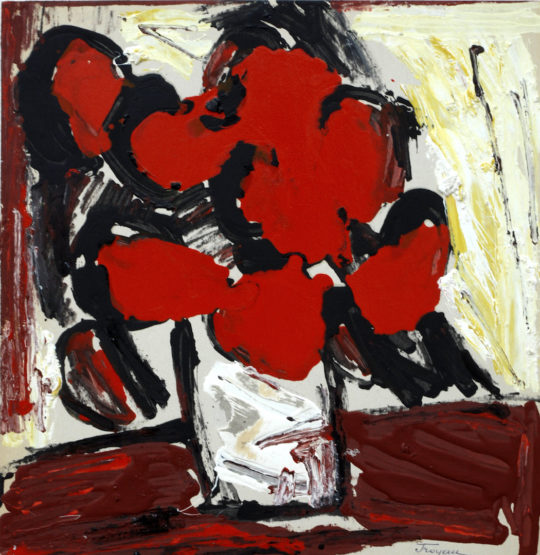
Always Remember, 1952
15 x 15.6 inches (38.1 x 39.62 cm) -
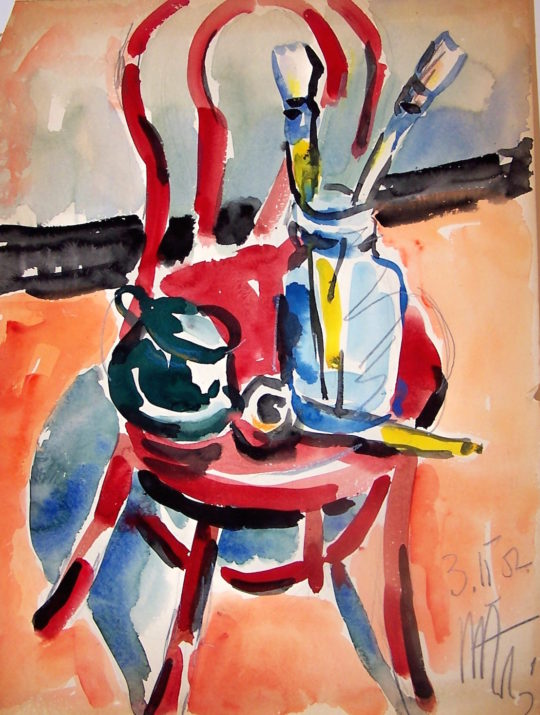
An Artist’s Chair, 1952
15 x 20 inches (38.1 x 50.8 cm) -
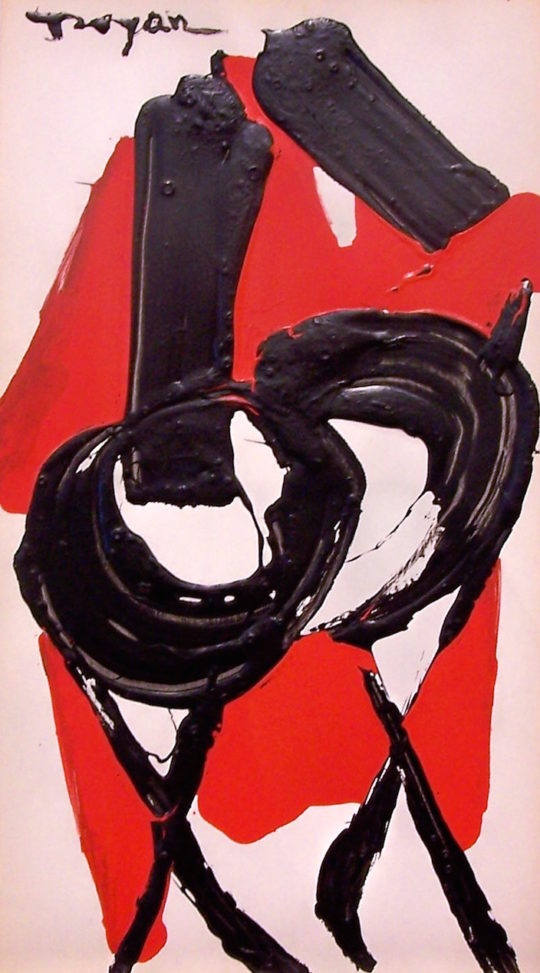
I See, 1952
11 x 20 inches (27.94 x 50.8 cm) -
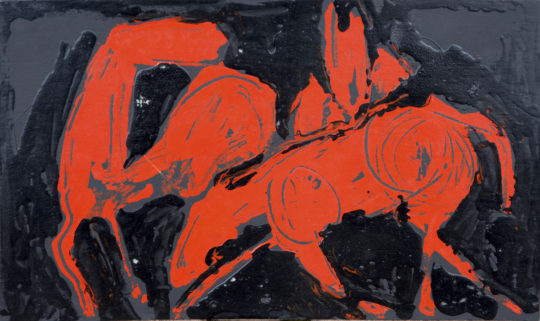
In the Primitive Way, 1953
15.12 x 9.5 inches (38.4 x 24.13 cm) -
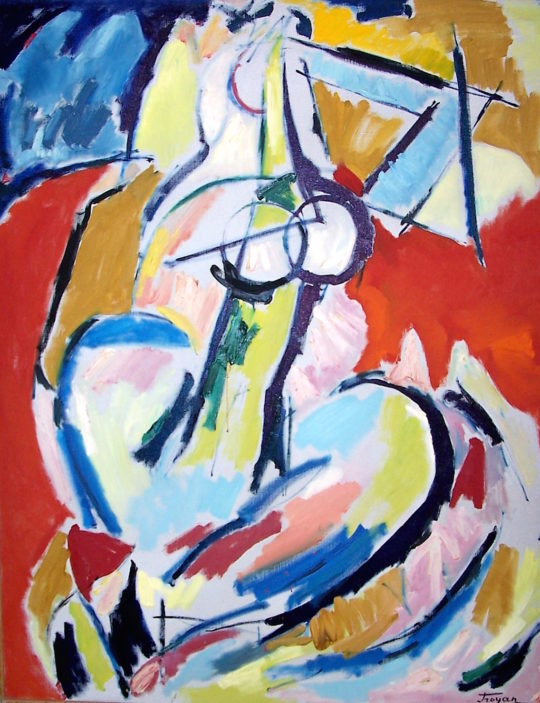
Love, 1960
40 x 50 inches (101.6 x 127 cm) -
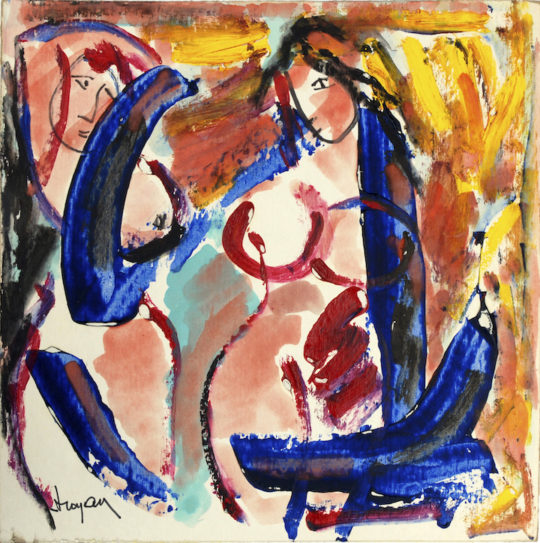
Old and Young, 1957
18 x 18 inches (45.72 x 45.72 cm) -
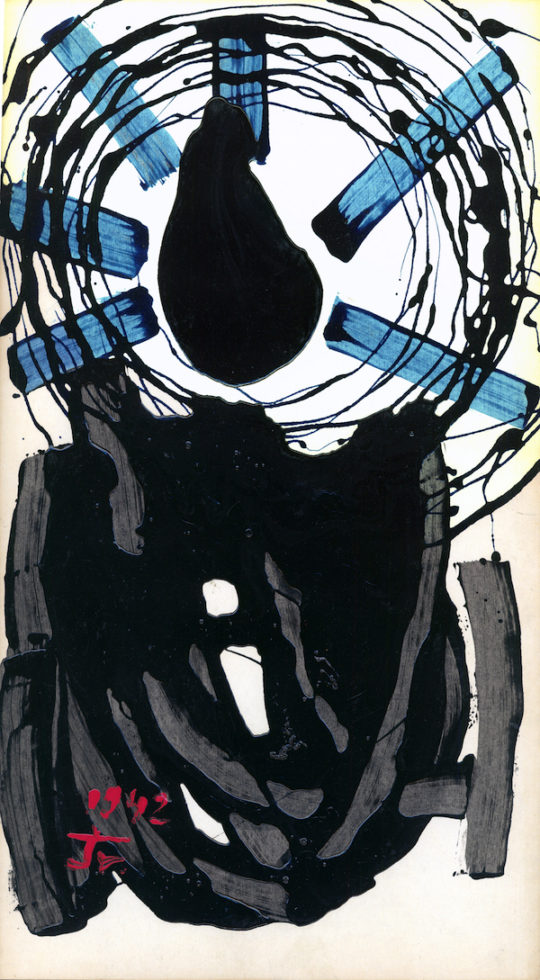
Set (from Warsaw in Chaos series), 1942
11 x 20 inches (27.94 x 50.8 cm) -
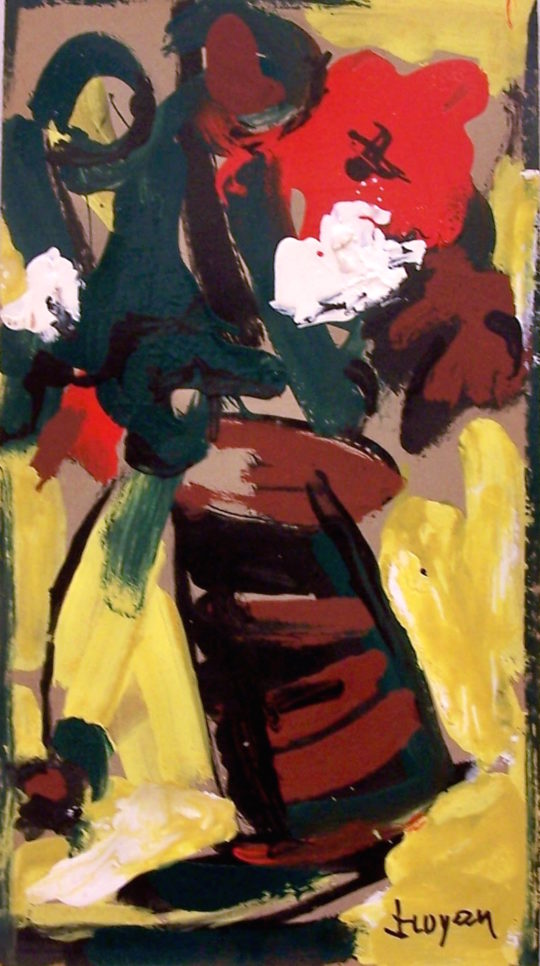
The Balance Act, 1952
11 x 20 inches (27.94 x 50.8 cm) -
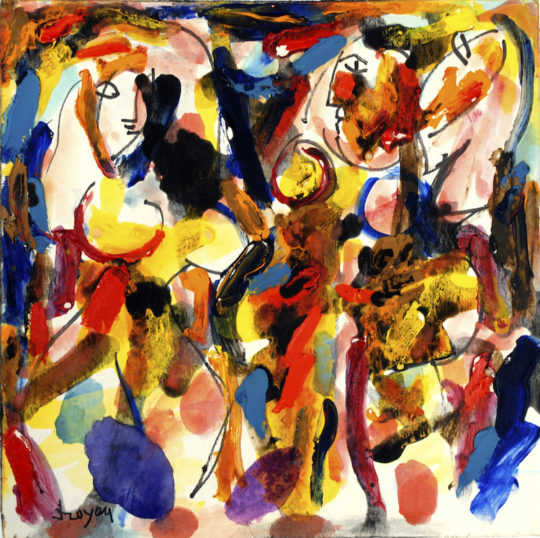
Women, 1957
18 x 18 inches (45.72 x 45.72 cm)
-

A Conversation, 1952
11 x 20 inches (27.94 x 50.8 cm) -

A Perspective, 1960
18 x 28 inches (45.72 x 71.12 cm) -

A Soft Word, 1960
10.5 x 14 inches (26.67 x 35.56 cm) -

Always Remember, 1952
15 x 15.6 inches (38.1 x 39.62 cm) -

An Artist’s Chair, 1952
15 x 20 inches (38.1 x 50.8 cm) -

I See, 1952
11 x 20 inches (27.94 x 50.8 cm) -

In the Primitive Way, 1953
15.12 x 9.5 inches (38.4 x 24.13 cm) -

Love, 1960
40 x 50 inches (101.6 x 127 cm) -

Old and Young, 1957
18 x 18 inches (45.72 x 45.72 cm) -

Set (from Warsaw in Chaos series), 1942
11 x 20 inches (27.94 x 50.8 cm) -

The Balance Act, 1952
11 x 20 inches (27.94 x 50.8 cm) -

Women, 1957
18 x 18 inches (45.72 x 45.72 cm)
No Press releases found.
No News found.
No Events Found.
